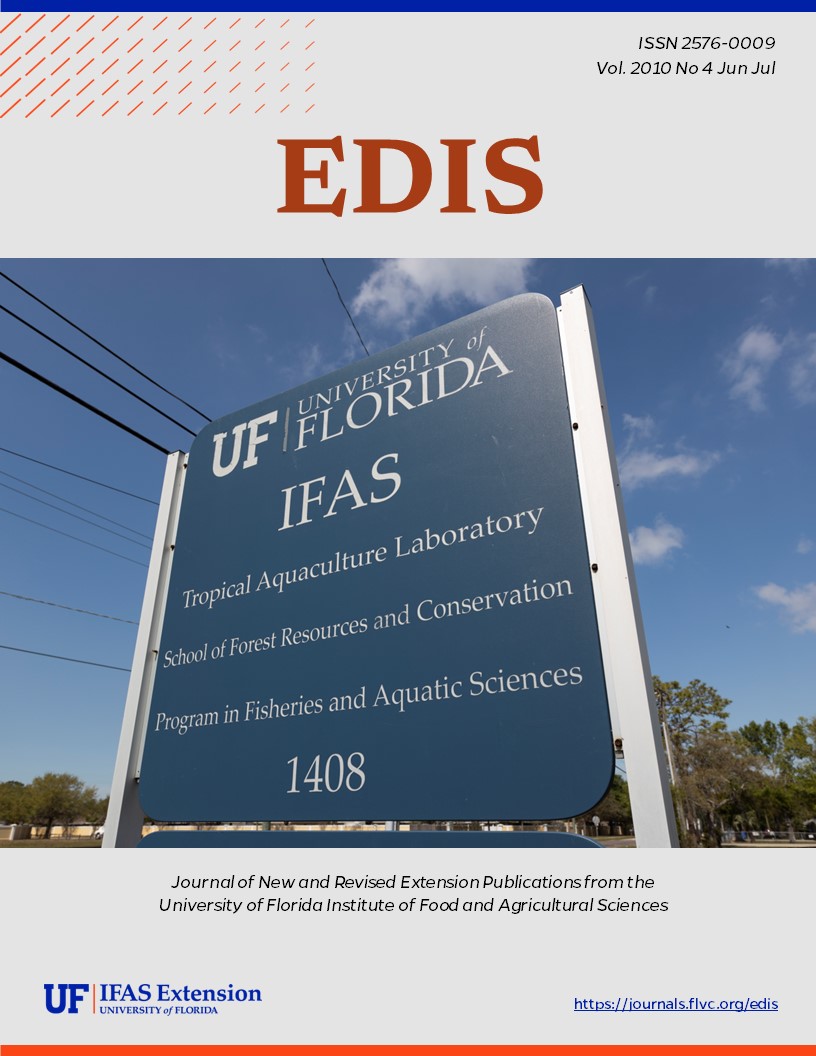Resumen
ENH1161, a 7-page report by Carrie R. Adams and Nancy M. Steigerwalt, presents the results of a survey of practitioners and land managers to determine research and outreach needs for restoration, enhancement, and management goals in the southeastern coastal plain. Includes references. Published by the UF Department of Environmental Horticulture, March 2010.
Citas
Edmiston, H. L., S. A. Fahrny, M. S. Lamb, L. K. Levi, J. M. Wanat, J. S. Avant, K. Wren, and N. C. Selly. 2008. Tropical storm and hurricane impacts on a Gulf Coast estuary: Apalachicola Bay, Florida. Journal of Coastal Research SI 55: 38-49. https://doi.org/10.2112/SI55-009.1
Kirkman, L. K., P. C. Goebel, L. West, M. B. Drew, and B. J. Palik. 2000. Depressional wetland vegetation types: A question of plant community development. Wetlands 20(2): 373-385. https://doi.org/10.1672/0277-5212(2000)020[0373:DWVTAQ]2.0.CO;2
Light, S. S., and J. W. Dineen. 1994. Water control in the Everglades: A historical perspective. In Everglades: The ecosystem and its restoration, ed. S. M. Davis and J. C. Ogden, 47-84. Boca Raton, FL: St. Lucie Press.
Main, M. B., and M. J. Barry. 2002. Influence of season of fire on flowering of wet prairie grasses in South Florida, USA. Wetlands 22(2): 430-434. https://doi.org/10.1672/0277-5212(2002)022[0430:IOSOFO]2.0.CO;2
Mitsch, W. J., J. W. Day Jr., J. W. Gilliam, P. M. Groffman, D. L. Hey, G. W. Randall, and N. Wang. 2001. Reducing nitrogen loading to the Gulf of Mexico from the Mississippi River basin: Strategies to counter a persistent ecological problem. BioScience 51(5): 373-388. https://doi.org/10.1641/0006-3568(2001)051[0373:RNLTTG]2.0.CO;2
Otvos, E. G., and G. A. Carter. 2008. Hurricane degradation-Barrier development cycles, northeastern Gulf of Mexico: Landform evolution and island chain history. Journal of Coastal Research 24(2): 463-478. https://doi.org/10.2112/06-0820.1
Pringle, C. M., M. C. Freeman, and B. J. Freeman. 2000. Regional effects of hydrologic alterations on riverine macrobiota in the new world: Tropical-temperate comparisons. BioScience 50(9): 807-823. https://doi.org/10.1641/0006-3568(2000)050[0807:REOHAO]2.0.CO;2
Schelske, C. L., E. F. Lowe, L. E. Battoe, M. Brenner, M. F. Coveney, and W. F. Kenney. 2005. Abrupt biological response to hydrologic and land-use changes in Lake Apopka, Florida, USA. AMBIO: A Journal of the Human Environment 34(3): 192-198. https://doi.org/10.1579/0044-7447-34.3.192
Schmitz, D. C. 2007. Florida's invasive plant research: Historical perspective and the present research program. Natural Areas Journal 27(3): 251-253. https://doi.org/10.3375/0885-8608(2007)27[251:FIPRHP]2.0.CO;2
Simberloff, D., D. Schmitz, and T. Brown. 1997. Strangers in paradise: Impact and management of nonindigenous species in Florida. Washington, DC: Island Press.
Slate, J. E., and R. J. Stevenson. 2000. Recent and abrupt environmental change in the Florida Everglades indicated from siliceous microfossils. Wetlands 20(2): 346-356. https://doi.org/10.1672/0277-5212(2000)020[0346:RAAECI]2.0.CO;2
Wilcove, D. S., D. Rothstein, J. Dubow, A. Phillips, and E. Losos. 1998. Quantifying threats to imperiled species in the United States. BioScience 48: 607-615. https://doi.org/10.2307/1313420
Tucker, J. W., Jr., and W. D. Robinson. 2003. Influence of season and frequency of fire on Henslow's sparrows (Ammodramus henslowii) wintering on Gulf Coast pitcher plant bogs. The Auk 120(1):96-106. https://doi.org/10.1093/auk/120.1.96
Ugarte, C. A., L. A. Brandt, S. Melvin, F. J. Mazzotti, and K. G. Rice. 2006. Hurricane impacts to tree Islands in Arthur R. Marshall Loxahatchee National Wildlife Refuge, Florida. Southeastern Naturalist 5(4):737-746 https://doi.org/10.1656/1528-7092(2006)5[737:HITTII]2.0.CO;2

